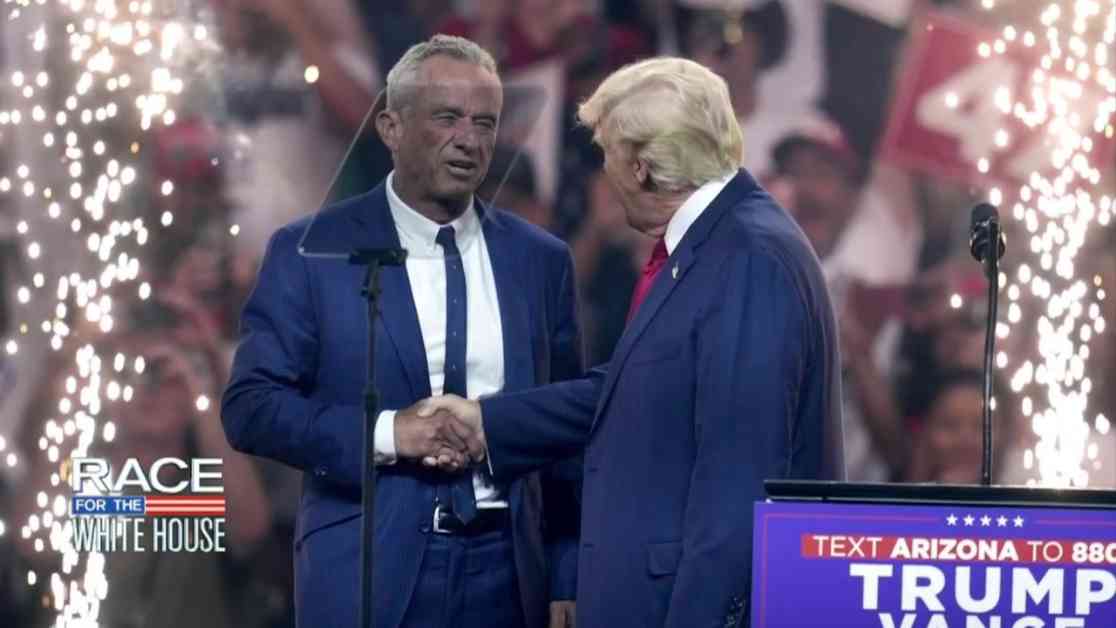Robert F. Kennedy Jr. made a surprising announcement on Friday, suspending his independent campaign for the White House and endorsing Donald Trump. This late-stage shakeup of the presidential race could potentially give Trump a boost from Kennedy’s supporters. The decision was followed by Kennedy joining Trump at a rally in Arizona, where the crowd erupted into cheers of “Bobby!”
Kennedy explained that his internal polls indicated that his presence in the race would harm Trump and benefit Democratic nominee Kamala Harris. However, recent public polls do not clearly show that he is significantly impacting support for either major-party candidate. Kennedy highlighted issues such as free speech, the war in Ukraine, and what he described as a “war on our children” as reasons for his decision to withdraw his name from the ballot in battleground states.
While Kennedy stated that he was endorsing Trump, he made it clear that he was not officially ending his presidential bid. He mentioned that his supporters could continue to back him in states where their votes are unlikely to sway the outcome. Despite taking steps to withdraw his candidacy in states like Arizona and Pennsylvania, officials in battleground states such as Michigan, Nevada, and Wisconsin stated that it would be too late for him to remove his name from the ballot.
Kennedy revealed that his decision to endorse Trump came after discussions with the former president over the past few weeks. He described their alliance as a “unity party,” emphasizing that they could openly disagree while working together. Kennedy hinted at the possibility of a job offer from Trump if he were to return to the White House, although specifics were not provided.
The announcement of Kennedy’s endorsement caused confusion and contradictions from his aides and allies, adding to the complexity of his quixotic campaign. Prior to his speech in Phoenix, a Pennsylvania court filing indicated that he would be endorsing Trump, only to be later clarified by a spokesperson for Kennedy. Despite the confusion, Kennedy took the stage to express his grievances with the Democratic Party, the media, and political institutions before explicitly endorsing Trump.
At the rally in Glendale, Arizona, where Kennedy joined Trump onstage, the former president praised Kennedy for raising important issues that had been overlooked in the country. Trump invoked the legacies of Kennedy’s slain uncle and father, John F. Kennedy and Robert F. Kennedy, stating that they would be proud of their actions. He also pledged to establish a new independent presidential commission on assassination attempts, along with investigating health conditions and childhood diseases with Kennedy’s involvement.
Kennedy’s decision to support Trump drew criticism from five of his family members, who called it “a sad ending to a sad story” and reiterated their support for Harris. Despite the backlash, Kennedy stood by his choice, acknowledging the strain it caused within his family. He expressed confidence in his decision, stating that it brought him internal peace even amidst challenges.
In response to Kennedy’s endorsement, Harris’s campaign chair reached out to his supporters who may be seeking an alternative to Trump. The campaign aimed to earn their backing by offering a new direction forward. At Kennedy’s event in Phoenix, one supporter expressed trust in Kennedy’s judgment and indicated a willingness to support Trump based on his recommendation.
Kennedy initially entered the 2024 presidential race as a Democrat before switching to an independent candidacy last fall. His campaign attracted a strong base of supporters, including anti-establishment voters and vaccine skeptics. However, financial struggles and legal challenges have posed obstacles to his bid for the presidency.
The endorsement of Trump by Kennedy resonated with some voters who viewed it as a reflection of the current state of the Democratic Party. Many saw it as a signal that Kennedy no longer identified with the party he once belonged to. Trump supporters welcomed the endorsement, with one voter expressing relief and excitement at the prospect of supporting Trump following Kennedy’s announcement.
Recent polls have shown Kennedy’s support in the mid-single digits, with uncertainty about his potential impact in a general election. While there is some indication that his candidacy could affect Trump more than Harris, the dynamics of the race remain fluid. Republicans have shown a stronger favorable view of Kennedy compared to Democrats, with a significant portion also holding a positive opinion of Trump.
Kennedy’s decision to suspend his campaign and endorse Trump has added a new dimension to the presidential race, sparking discussions about the future of the Democratic Party and the impact of third-party candidates. As the election season progresses, the implications of Kennedy’s actions on the political landscape will continue to unfold.


